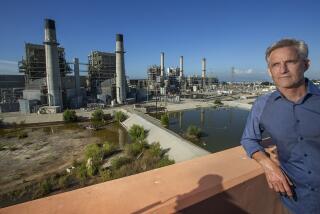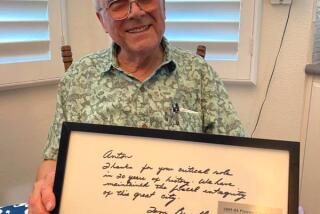Era Ends in Montreal--Mayor Drapeau to Retire
- Share via
MONTREAL — Mayor Jean Drapeau, one of North America’s last autocratic, all-powerful big city machine leaders, has announced that he is retiring from the post he has held for a generation.
“My career will end with this current term this November,” Drapeau, 70, said in a statement read at a rare news conference last week.
Citing a series of health problems, including a 1982 stroke and a broken vertebra last December, Drapeau said he could not, “in all honesty,” seek another term. He twice broke into sobs as he read the statement.
Drapeau, who was first elected when Dwight D. Eisenhower was in his first term as U.S. President, was a mayor in the mold of Chicago’s late Richard J. Daley. He ran his city as a personal fiefdom, once going six months without a news conference or public appearance.
“I don’t believe in the democracy of the street,” Drapeau once told a reporter who asked about his secretive and personal way of running Montreal.
Massive Debt
Drapeau, who has been Montreal’s mayor for 29 of the last 32 years, leaves a city that is better off than when he was first elected in 1954--and, at the same time, worse off.
Montreal has one of the world’s best subway systems, a convention center, a major league baseball team and a sense of civic pride resulting from the successful 1967 World’s Fair and the 1976 Summer Olympic Games, all credited to Drapeau.
Yet he has saddled the city and the province of Quebec with massive debt, and he is blamed for distracting the city from its basic problems with dreams of mega-projects, including a high-speed train to New York and a huge downtown arts and concert hall.
In what was apparently an unintended juxtaposition, Drapeau held his news conference within sight of the structure that has become the symbol of his successes and failures--Montreal’s Olympic Stadium.
The stadium is used by the Montreal Expos of the National League and the Alouettes of the Canadian Football League. But it has yet to be completed, a reminder of the $1.33-billion deficit resulting from what a provincial investigation termed mismanagement and irresponsibility. When Drapeau was bidding on the Olympic Games, he said his government could “no more have a deficit than a man could have a baby.”
Slipping in Polls
Although the mayor indicated that his uncertain health is his reason for not running again, recent public opinion polls suggest another reason. From a time when he won election with 92% of the vote, carrying his supporters to a complete sweep of all 54 City Council seats, recent polls indicate that he would now get only 38%.
Drapeau’s decision completes a sweeping change in Canada’s political makeup. After the retirement of Prime Minister Pierre Elliott Trudeau and Rene Levesque, the premier of Quebec, Drapeau was the only surviving public figure who helped to shape the nation’s modern political life.
He once told a reporter that he spent his first term in office “going to every meeting, talking to every citizen and answering every phone call.” The result, he said, was his only defeat--a failed bid for reelection in 1957.
He regrouped and, promising to make Montreal a world-class city, put together a political machine that proved virtually unmatched.
He leaves office with “no regrets,” he said.
Asked what he would change if he could go back, Drapeau looked at the questioner for a moment and said, “I would surely do the same things.”
More to Read
Sign up for Essential California
The most important California stories and recommendations in your inbox every morning.
You may occasionally receive promotional content from the Los Angeles Times.










